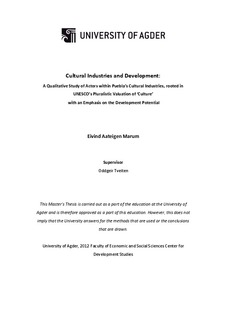Cultural industries and development : a qualitative study of actors within Puebla's cultural industries, rooted in UNESCO's pluralistic valuation of "culture" with an emphasis on the development potential
Master thesis
Permanent lenke
http://hdl.handle.net/11250/135255Utgivelsesdato
2012Metadata
Vis full innførselSamlinger
Sammendrag
Activity in the cultural industries accounts for a great deal of the global GDP. The
role of cultural industries in a development context has gained much attention during
the past decades. International bodies like UNESCO are especially emphasizing the
importance of the cultural industries, as they have the potential of generating
employment and welfare – but also because cultural expression and activity is
something of intrinsic value and essential for human development beyond economic
terms; it defines who we are and conveys existential attributes such as identity,
heritage and meaning. This paper seeks to investigate certain linkages within the
cycle of activities that is the ‘cultural industries’.
A fieldwork was carried out in the city of Puebla, Mexico, with the aim of looking
into the relationships between producers of cultural goods and the agencies charged
with governance of cultural services. The main objectives were stated as to 1)
investigate how efforts regarding governance of cultural industries may bring about
development, and 2) consider possible tensions that might serve as obstacles in order
to carry out efficient and beneficial cultural policies. In order to approach these
objectives, a qualitative research design was elaborated and data was drawn from the
various interviews with artists and representatives of agencies.
While UNESCO brings the legitimacy of bringing ‘culture’ in on the development
arena, complementary research on the field is employed so as to identify possible
connections between findings and theory. The findings reveal that Puebla is a city
with continuous cultural activity at many levels, embracing a vast array of different
artistic expressions. The analytical discussion draws possible parallels between
findings and theory and sheds light on possible tensions in the relationship between
‘artists’ and ‘institutions’, ‘culture’ and ‘industry’.
Beskrivelse
Master thesis in development management- University of Agder 2012
